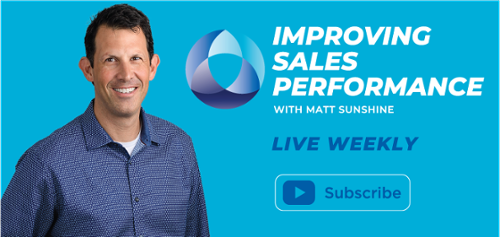
In this episode, we’re discussing how to ensure your sales teams are focused on the right sales activities to drive performance.
And joining Matt Sunshine to help break it all down is Jeff Clewett, Director of Sales at Bonneville Denver, and Emily Estey, VP/Senior Consultant here at CSS.
Both offer some amazing points to think about, like:
- Why too many sales managers treat everything as an emergency when they need to be prioritizing and filtering the right information for their teams
- How target drives can help put a spotlight on the activities that actually make you money
- And, finally, if you’re coaching Michael Phelps, you’re not going to teach him to run.
The Challenge: Prioritization and Focus
One of the biggest hurdles sales leaders face is maintaining their teams' focus on the right activities.
Jeff highlights that leadership itself can often be the obstacle, with multiple agendas and last-minute strategies creating noise that distracts the team.
“I think we can pose or be the biggest hurdle to communication and clear focus,” he says. “because of all the agendas and things, we have to focus on, whether it hear things from other levels of leadership or other strategies that are being implemented on the fly.
“Our goal is to make sure we keep horse blinders on our teams and make sure that we get to decipher where the real focus should be, regardless of what's changing on spreadsheets or on charts.
We’ve got to ensure that our team is always focused, based on what we're telling them is important.”
Emily adds, “It's hard, but I think many sales managers treat everything as an emergency. You know, everything that pops up has to be dealt with. Right now, prioritization needs to happen with every bit of information that [your team is] getting.
And then there's also a dam that needs to happen, like, ‘what am I going to deal with and what am I going to move forward to with my team?’”
Leveraging Data to Guide Action
While intuition and experience are valuable, data provides clear indicators of where processes are slowing down and where efforts should be concentrated.
“You know, we talk about busy activities versus productive activities,” Jeff says. “And what the data would tell us is volume is not the goal here.
“We often refer to that as ‘empty calories.’ You're just doing stuff to do stuff. It doesn't make sense.
“We're in the outcomes business. What's the next step? You know, sales is all about inertia, and that data helps us inform where we're getting plugged up and where we can take some action to get past it.
“When you leave on Friday and you're driving home, you go, ‘How do I know I had a good week?’ What outcomes did you achieve this week?
“Not, ‘what did you do’ but ‘what did you accomplish?’”
The Power of Target Drives
Target drives can be an effective motivator, but they need to be carefully managed to avoid focusing solely on quantity over quality. Emily shares an example of a successful target drive at Bonneville Denver.
She says, “Jeff was hyper-focused on making sure that we were talking to quality prospects. And they came to me with their list and we were like, ‘yes, no, yes, no, yes, yes.’ So, we really dove in.
“This is going to sound obvious, but if you're not starting with the quality, it's just not going to work. And with the AE’s choosing the right prospects, that target drive went really well.” By carefully selecting the right targets, the team was able to start on the right foot and see significant results.
Jeff expands on this, explaining that the benefits of a target drive extend beyond the initial period. “For a 12-week period, or however long you want to conduct target drive, it's truth serum, right?” he says. “Then you get out of the, ‘I'm just doing this to look good’ or to check a box, and it turns into the actions and activities that are actually going to make me some money and help my clients.
“And what often gets lost in a target drive, and the reason we love to do them earlier on in the year, is the dividends that pay out after the 12 weeks.
“Because for 12 weeks, just getting that singular focus early on in a year, you know you may not have someone convert in 12 weeks, but you're doing everything you can, and you're flipping out more people, and you're working harder towards that main singular objective.
“You know, months from now, you're having conversations with these target level, quality accounts that maybe weren't ready yet or they didn’t have all the other boxes checked.
“So, you're doing the work early to pay dividends later in the year, which I love about the target drive.”



